- Clone
- HM-CCR5 (See other available formats)
- Regulatory Status
- RUO
- Other Names
- CCR5, C-C chemokine receptor type 5, HIV-1 fusion co-receptor
- Isotype
- Armenian Hamster IgG
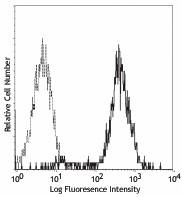
-

CCR5 transfected cell line NRK/CCR5 stained with HM-CCR5 PE
| Cat # | Size | Price | Quantity Check Availability | ||
|---|---|---|---|---|---|
| 107005 | 50 µg | $122.00 | |||
| 107006 | 200 µg | $353.00 | |||
CD195 is a 45 kD chemokine receptor also known as CCR5. CD195 is a seven transmembrane-spanning G protein-associated molecule expressed on macrophages, a T cell subset, and in the heart, liver, and spleen. CD195 regulates lymphocyte chemotaxis and transendothelial migration during inflammatory processes. CD195 interacts with several ligands including RANTES, MCP-1, MIP-1α, and MIP-1β.
Product Details
- Verified Reactivity
- Mouse
- Antibody Type
- Monoclonal
- Host Species
- Armenian Hamster
- Formulation
- Phosphate-buffered solution, pH 7.2, containing 0.09% sodium azide.
- Preparation
- The antibody was purified by affinity chromatography, and conjugated with PE under optimal conditions.
- Concentration
- 0.2 mg/ml
- Storage & Handling
- The antibody solution should be stored undiluted between 2°C and 8°C, and protected from prolonged exposure to light. Do not freeze.
- Application
-
FC - Quality tested
- Recommended Usage
-
Each lot of this antibody is quality control tested by immunofluorescent staining with flow cytometric analysis. For flow cytometric staining, the suggested use of this reagent is ≤1.0 µg per million cells in 100 µl volume. It is recommended that the reagent be titrated for optimal performance for each application.
- Excitation Laser
-
Blue Laser (488 nm)
Green Laser (532 nm)/Yellow-Green Laser (561 nm)
- Application Notes
-
CCR5 is expressed at low density on activated cells. For successful immunofluorescent staining results, it may be important to maximize signal over background by using a relatively bright fluorochrome-antibody conjugate (Cat. No. 107006) or by using a high sensitivity, three-layer staining technique (e.g., including a biotinylated antibody (Cat. No. 107004) or biotinylated anti-Armenian hamster IgG (Cat. No. 405501) second step, followed by SAv-PE (Cat. No. 405204)).
-
Application References
(PubMed link indicates BioLegend citation) - Product Citations
-
- RRID
-
AB_313300 (BioLegend Cat. No. 107005)
AB_313300 (BioLegend Cat. No. 107006)
Antigen Details
- Structure
- β-chemokine receptor, 45 kD
- Distribution
-
Macrophages, T cell subset, heart, spleen, liver
- Function
- Lymphocyte chemotaxis and transendothelial migration during inflammation, signaling through seven transmembrane-spanning G proteins
- Ligand/Receptor
- RANTES, MCP-1, MIP-1α, and MIP-1β
- Cell Type
- Dendritic cells, Macrophages, T cells
- Biology Area
- Immunology, Innate Immunity
- Molecular Family
- CD Molecules, Cytokine/Chemokine Receptors, GPCR
- Antigen References
-
1. Barclay AN, et al. 1997. The Leukocyte Antigen FactsBook Academic Press.
2. Napolitano M, et al. 1990. J. Exp. Med. 172:285.
3. Meyer A, et al. 1996. J. Biol. Chem. 271:14445.
4. Boring, et al. 1996. J. Biol. Chem. 271:7551. - Gene ID
- 12774 View all products for this Gene ID
- UniProt
- View information about CD195 on UniProt.org
Other Formats
View All CD195 Reagents Request Custom Conjugation| Description | Clone | Applications |
|---|---|---|
| Biotin anti-mouse CD195 (CCR5) | HM-CCR5 | FC |
| PE anti-mouse CD195 (CCR5) | HM-CCR5 | FC |
| Alexa Fluor® 488 anti-mouse CD195 (CCR5) | HM-CCR5 | FC |
| Alexa Fluor® 647 anti-mouse CD195 (CCR5) | HM-CCR5 | FC |
| APC anti-mouse CD195 (CCR5) | HM-CCR5 | FC |
| PerCP/Cyanine5.5 anti-mouse CD195 (CCR5) | HM-CCR5 | FC |
| PE/Cyanine7 anti-mouse CD195 (CCR5) | HM-CCR5 | FC |
| TotalSeq™-A0376 anti-mouse CD195 (CCR5) | HM-CCR5 | PG |
| TotalSeq™-B0376 anti-mouse CD195 (CCR5) | HM-CCR5 | PG |
| TotalSeq™-C0376 anti-mouse CD195 (CCR5) | HM-CCR5 | PG |
Compare Data Across All Formats
This data display is provided for general comparisons between formats.
Your actual data may vary due to variations in samples, target cells, instruments and their settings, staining conditions, and other factors.
If you need assistance with selecting the best format contact our expert technical support team.
-
Biotin anti-mouse CD195 (CCR5)
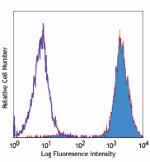
Mouse CCR5 transfected cells stained with biotinylated HM-CC... -
PE anti-mouse CD195 (CCR5)
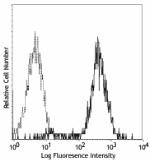
CCR5 transfected cell line NRK/CCR5 stained with HM-CCR5 PE -
Alexa Fluor® 488 anti-mouse CD195 (CCR5)
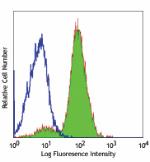
Mouse CCR5 transfected cells stained with HM-CCR5 Alexa Fluo... -
Alexa Fluor® 647 anti-mouse CD195 (CCR5)
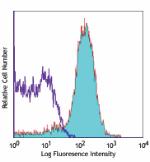
Mouse CCR5 transfected cells stained with HM-CCR5 Alexa Fluo... -
APC anti-mouse CD195 (CCR5)
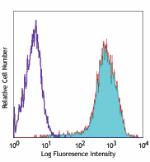
Mouse CCR5 transfected cells stained with HM-CCR5 APC -
PerCP/Cyanine5.5 anti-mouse CD195 (CCR5)
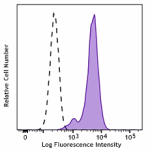
Mouse CD195 (CCR5) transfected NRK cells were stained with C... -
PE/Cyanine7 anti-mouse CD195 (CCR5)
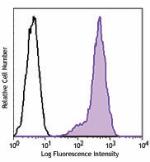
Mouse CD195 (CCR5) transfected NRK cells were stained with C... -
TotalSeq™-A0376 anti-mouse CD195 (CCR5)
-
TotalSeq™-B0376 anti-mouse CD195 (CCR5)
-
TotalSeq™-C0376 anti-mouse CD195 (CCR5)
